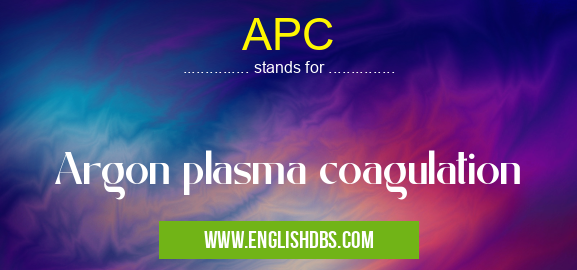What does APC mean in MEDICAL
Argon plasma coagulation (APC) is a medical procedure used to treat several gastrointestinal and respiratory conditions. It involves using an argon gas-delivered electrical current to create heat in areas of tissue that are affected by the condition being treated. APC is widely used in endoscopy, particularly gastroscopy, bronchoscopy and cystoscopy, for the treatment of various diseases. This procedure helps reduce bleeding, pain and inflammation in the affected area.

APC meaning in Medical in Medical
APC mostly used in an acronym Medical in Category Medical that means Argon plasma coagulation
Shorthand: APC,
Full Form: Argon plasma coagulation
For more information of "Argon plasma coagulation", see the section below.
Benefits of APC
The major benefits associated with APC include minimal invasiveness, improved accuracy and control over treatment size and intensity, greater precision in targeting lesions while sparing healthy tissue, faster recovery times, shorter hospital stays, lower costs compared to traditional surgical procedures and no risk of physical scarring from surgery or radiation therapy. Additionally, the use of argon plasma eliminates the need for sutures or stapling in some cases altogether, reducing patient discomfort during post-treatment recovery time.
Applications
A wide array of conditions can be treated with Argon Plasma Coagulation including esophageal varices bleeding and ulcers caused by Helicobacter pylori infection; Barrett's Esophagus; cancerous or precancerous lesions; polyps in the gastrointestinal tract; strictures in the upper or lower GI tract; angiodysplasia (abnormal enlargement of small blood vessels); inflammatory bowel diseases such as Crohn's disease or ulcerative colitis; sinus infections; tracheal stenosis (narrowing); emphysema and more.
Essential Questions and Answers on Argon plasma coagulation in "MEDICAL»MEDICAL"
What is Argon Plasma Coagulation?
Argon Plasma Coagulation (APC) is a minimally invasive medical procedure used to treat bleeding tissue in the gastrointestinal tract. It involves the application of argon gas and a mild electric current to coagulate, or ‘seal off’, the damaged tissue. This helps maintain proper blood flow to the area and prevent further bleeding.
What conditions can be treated with APC?
Argon Plasma Coagulation is most commonly used as a treatment for vascular lesions such as angiodysplasia in patients with conditions like colon cancer or inflammatory bowel disease. It can also be used to treat ulcers, bleeding polyps, and tumors.
How is APC performed?
During an APC procedure, a doctor places an endoscope with a specialized tip into the patient’s affected area. The tip delivers argon gas along with a mild electric current which helps coagulate the affected tissue. The entire procedure usually takes about thirty minutes.
What are the benefits of using APC?
The primary benefit of using Argon Plasma Coagulation over traditional methods is that it is minimally invasive, meaning there is no major surgery involved and recovery times are much shorter. Additionally, studies have found it to be very effective at treating certain gastrointestinal conditions such as angiodysplasia and ulcers.
Are there any risks associated with APC?
Like all forms of medical treatment, there are risks associated with APC. These may include intestinal perforations due to the heat generated from the electric current and risk of infection from bacteria carried by the endoscope itself. Additionally, some patients may experience discomfort during or after their procedure due to irritation caused by argon gas and electricity in contact with delicate tissue.
Is anesthesia required for APC?
Anesthesia is not usually needed when undergoing an Argon Plasma Coagulation procedure since it involves topics that are relatively painless for most patients; however, some doctors may choose to administer local anesthesia if they feel like it would make their patient more comfortable during or after their procedure..
How long will I need to stay in hospital after an APC treatment?
Depending on your condition you may be discharged from hospital within one hour of undergoing an Argon Plasma Coagulation procedure; however, some patients may need observation afterwards so this could extend up to 24 hours.
Does my insurance cover APC treatments?
Most health insurance providers recognize Argon Plasma Coagulation procedures as medically necessary treatments given its efficacy for certain gastrointestinal diseases and disorders; however you should still check your individual policy for coverage details.
Will I need any follow-up care after my APC treatment?
Your doctor will likely recommend follow-up visits shortly after your APC treatment in order to monitor your progress and ensure that everything has healed properly; additionally you should keep them informed about any changes or symptoms such as pain or excessive bleeding.
Final Words:
By carefully modulating its power settings, APC provides a safe and efficient method for treating a variety of ailments that would otherwise require more invasive surgical options such as open surgery or radiation therapy – both with much higher risks to patient health and wellbeing. While it is important to discuss any potential risks with your physician before undergoing this type of treatment, APC carries few if any side effects relative to other forms of treatment.
APC also stands for: |
|
| All stands for APC |
